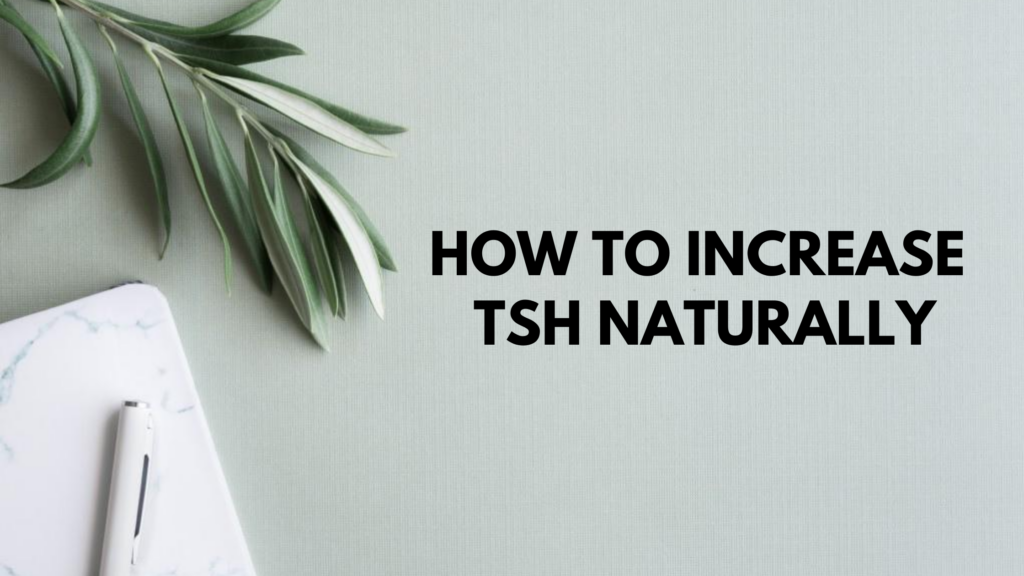Low TSH levels, often diagnosed as hyperthyroidism, affects 2-5% of all women mostly between the ages of 20-40 years old. I’m excited to tell you that there are ways to increase TSH naturally without spending tons of money on supplements.
Let’s dive in!
First, let’s review what TSH is and what a “normal” level is (this is important to understand, so please read these next few paragraphs before going down to the 8 steps listed below!):
TSH is a hormone that the pituitary sends out to tell the thyroid how much or how little thyroid hormones to produce.
Please note: TSH is a pituitary hormone, not a thyroid hormone. TSH does not tell you how much thyroid hormone your thyroid is producing. It also isn’t telling you how much thyroid hormone that is going to the cells of your body.
Everyone is biochemically individual, but in general, a TSH level between 0.5-2.0mIU/L is the optimal range where people feel healthy and vibrant.
The pituitary, hypothalamus and adrenals (also called the HPA-axis) are all part of the endocrine system and communicate with one another throughout the day. When the body perceives stress (for those with hyperthyroidism, this is usually in the form of emotional or environmental stress), the hypothalamus can tell the pituitary to produce less TSH so the thyroid will produce more hormones to keep the body functioning.
So, a low TSH level isn’t necessarily a thyroid problem. Instead, it’s often an imbalance in the HPA axis. Your practitioner’s job is to figure out why there is an imbalance.
A low TSH doesn’t always mean the body is in a state of hyperthyroidism:
Most allopathic doctors only test TSH to diagnose if a patient is hypothyroid or hyperthyroid. The danger in this is that your thyroid might actually be making plenty of thyroid hormone, but if they only check your TSH and it’s low, they might prescribe thyroid hormone medication that your body doesn’t actually need. This can create a situation where you take too much thyroid hormone for your body, which can then drive you into a real state of hyperthyroidism.
I’ve seen many clients who had low TSH but their fT4 and fT3 were either low, or in normal ranges. This is why you always want to have a full thyroid panel.
TSH can also be low when there are TSI (aka Graves’ antibodies) present, so again, this is why you want to get a thyroid panel so you have more pieces of the puzzle.
These thyroid labs will give you nice snapshot of how your thyroid is doing:
TSH
fT4
fT3
rT3
TPOab
TgAB
TSI (if Graves’ disease is suspected)
These labs can also be helpful to determine where other imbalances might be in the body:
CBC
CMP
Phosphorus
Vitamin D
Lipids
Iron panel
Saliva cortisol test
Now that we understand the basics of low TSH, here are 8 steps to increase TSH naturally:
1. Take steps to support your adrenals. As mentioned above, low TSH is usually rooted in an imbalance in the HPA axis, and the most common cause of low TSH is adrenal imbalance from stress (mental, physical, emotional, psychological etc.).
I can’t tell you how many people that have taken the steps I list in this article and come back a month or two later telling me how much better they already feel! I’ve also had clients in our practice follow many of these steps, and we’ve seen their TSH levels balance out within just a few of months.
2. If you’re on medications, talk to your doctor about the dose you are currently on. The reason for this is because allopathic doctors often only test TSH to diagnose and treat thyroid disease. The problem with this is that, as I mentioned above, TSH is a pituitary hormone and not a thyroid hormone. You need to test thyroid hormones to know how much or how little the thyroid is actually producing.
I’ve seen many clients who are on thyroid medications with a dose that is too high, and that’s what’s most likely causing their TSH to be too low. In most cases, you have to be your own advocate, read your labs, and ask questions.
As a side note – I never tell clients how much of a medication to take, or when to start or stop a medication. If I see elevated fT4 or fT3 and they are on thyroid medication, I encourage them to talk to their doctor about their current prescription.
3. Get tested monthly. If your TSH is below .50mIU/L, I recommend getting your TSH tested monthly until it comes back into a normal range. Your doctor can assist you in this, or you can get it tested yourself through True Health Labs.
4. Take an honest look at the emotional stress in your life. Low TSH is often rooted in emotional stress, so it’s helpful to make a list of stressful things that have happened throughout your life and evaluate what you need to do about those things.
Talking to a friend, family member, counselor or therapist can also be very helpful.
5. Another common root cause of low TSH is toxicity in the body. Taking steps to remove all processed foods from the body and supporting liver detoxification can be incredibly helpful.
6. Make sleep a priority. The body cannot heal and come back into balance without adequate sleep. If insomnia is an issue right now, read this article and see which steps you can take to improve your quality of sleep.
7. Avoid skipping meals, intermittent fasting or super low-carb diets (such as keto). All of these things can put excess strain on the adrenals and cause cortisol and/or blood sugar imbalance, which can then result in low TSH.
I know intermittent fasting and low carb diets like keto are popular right now, and sometimes those with thyroid disease will feel good for a short time period while on one of these kinds of diets, but they usually backfire down the road. It simply puts too much strain on an already stressed body and creates additional hormone imbalance, so I really don’t recommend it.
8. Limit caffeine. Caffeine and is like liquid stress for the body which can create an imbalance in the HPA-axis and lower TSH, so it’s really best to limit your coffee consumption.
If you need some help reducing how much coffee you drink (I know it can be hard!), then read this article I wrote about how to kick the caffeine habit without having the crazy withdrawal symptoms.
If you’d like more education about thyroid disease and are looking for a proven protocol to follow, I recommend checking out my 90-Day Thyroid Support and Health Reset. In the course, I cover thyroid disease, adrenal imbalance, how to read your labs, supplements, autoimmunity, how to lower antibodies, blood sugar balance, gut health, liver detoxification, and much, much more.
Note: The purpose of this post is to give an overview of some common root causes of low TSH from a holistic perspective. Due to biochemical individuality there can be many various reasons for the root causes of low TSH. This information is not intended to take the place of your doctor’s advice.




23 Comments